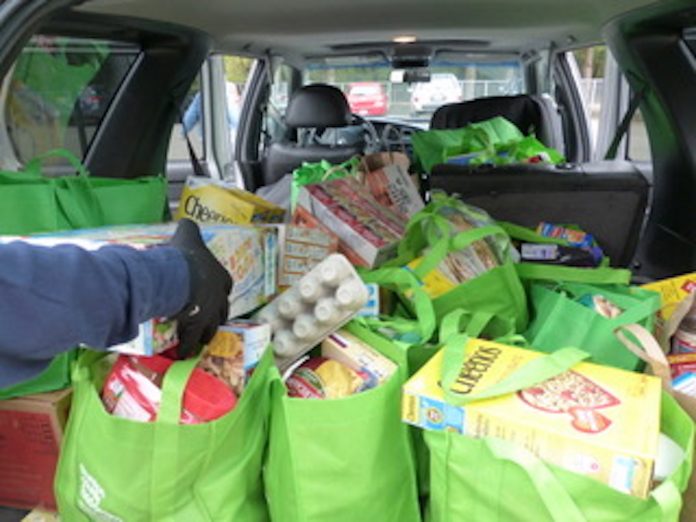
A clerk asking if you have brought your bags is common refrain at Thurston County grocery stores and shops. If it is the second Saturday of the pick-up month for the Thurston County Food Project (TCFP), the echoing refrain is, “Did you remember to place the Green Bag on your front porch?” The effort it takes to scour your pantry six times a year and fill a bag with nutritious food is minimal compared to the rewards. One in five children in Thurston County is considered “food insecure” and 44% of the clients served by the Food Bank are children, 41% are adults ages 18-59, and 15% are seniors.
 Don and Mary Beth Cline launched our local TCFP in 2010 after visiting a similar project in Ashland, Oregon that their friend John Javna had established. They returned home, gathered some neighbors in their CRANA (Cain Road Area Neighborhood Association), went to the local leadership with the plan, and the TCFP was launched with just a few neighbors participating.
Don and Mary Beth Cline launched our local TCFP in 2010 after visiting a similar project in Ashland, Oregon that their friend John Javna had established. They returned home, gathered some neighbors in their CRANA (Cain Road Area Neighborhood Association), went to the local leadership with the plan, and the TCFP was launched with just a few neighbors participating.
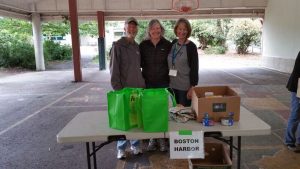
Six years and $200,000 of donated food later, the program has expanded to include several additional neighborhoods and 21 neighborhood coordinators. My husband and I have participated in our Boston Harbor neighborhood TCFP since the program started in October 2015, but I had never met Cedar Bouta, who, with Larry Goldstein and Margo Hill, coordinate our neighborhood’s food collection.
“The secondary goal of the food project, and an important one, is to strengthen relationships between neighbors and build close-knit neighborhoods,” Cedar explained when we met. Although we live less than two blocks from each other, our paths had never crossed. I learned of a similar experience when I visited Mary Beth in her TCFP office where she works tirelessly on this project. She received a call from a neighbor inviting her to dinner that evening, and when she hung up, she said, “Even though both of us have lived here over 30 years, I never knew my neighbor across the street until we started our TCFP, and now I can’t imagine not enjoying her friendship.”
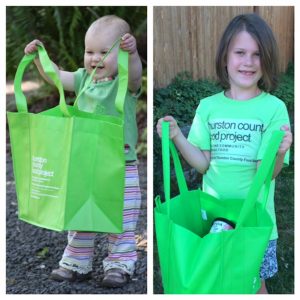
Making neighborhood friends is a nice bonus, but the primary goal of the TCFP is to provide a steady, sustainable collection of food for the Food Bank on a regular basis rather than a one-time Food Drive like many organizations plan around the holidays. “Although it is important to have a full food pantry during the holidays,” Cedar told me, “it is actually the summer months that are the leanest.” With children not in school receiving subsidized meals, the need is great. Thanks to six pick-up dates throughout the year, the Thurston County Food Bank can count on replenishing their shelves on a consistent basis.
Having heard about the TCFP from a colleague, Cedar posted a notice on our Boston Harbor Nextdoor site. Fourteen neighbors responded to the post and received their green bags with a tag attached listing the dates of pick-up. The October 2015 pick up initiated the green bag ritual in our community.
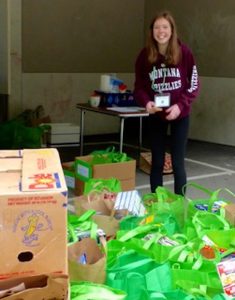
The original 14 donors in Boston Harbor has now expanded to 35 after Cedar and Margo visited the Sewer Sisters Garden Club and asked for the members’ help in getting the word out. In the six pick-ups since its launch, our neighborhood has donated $5,817 worth of food, which is enough to feed a family of four for a year according to Fran Potasnik, the Thurston County Food Bank project coordinator. The average participation rate for each pickup has been 82%.
On pick-up Saturdays, Pioneer Elementary is a hub of activity. Cedar, Larry and Margo join the other neighborhood coordinators unloading the food from their bags into banana boxes for transport to the Food Bank. “I truly enjoy the happy bedlam helping load that empty truck and seeing it pull away joyfully loaded with food for neighbors in need,” Cedar reflected.
Mary Beth hopes that more young people like Molly Anders, a student at Olympia High School who helps her with green bag pick-ups in the CRANA neighborhood, will see this project as an opportunity to volunteer and participate in community service.
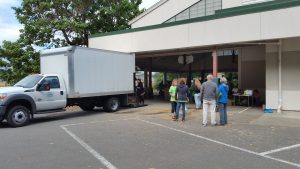
Originally a grass roots neighborhood project, TCFP has received new momentum from organizations like the First United Methodist Church of Olympia. Their congregation has decided to join the effort as a community, which may be the beginning of a new trend. The process for coordinating a new neighborhood or group has been streamlined, and Mary Beth happily provides initial materials.
She mused as we were ending our conversation, “What about a book group taking on this project?” I may just take her up on that idea!
If you wish to learn more or participate in the Thurston County Food Project, contact Mary Beth Cline via email.

















































